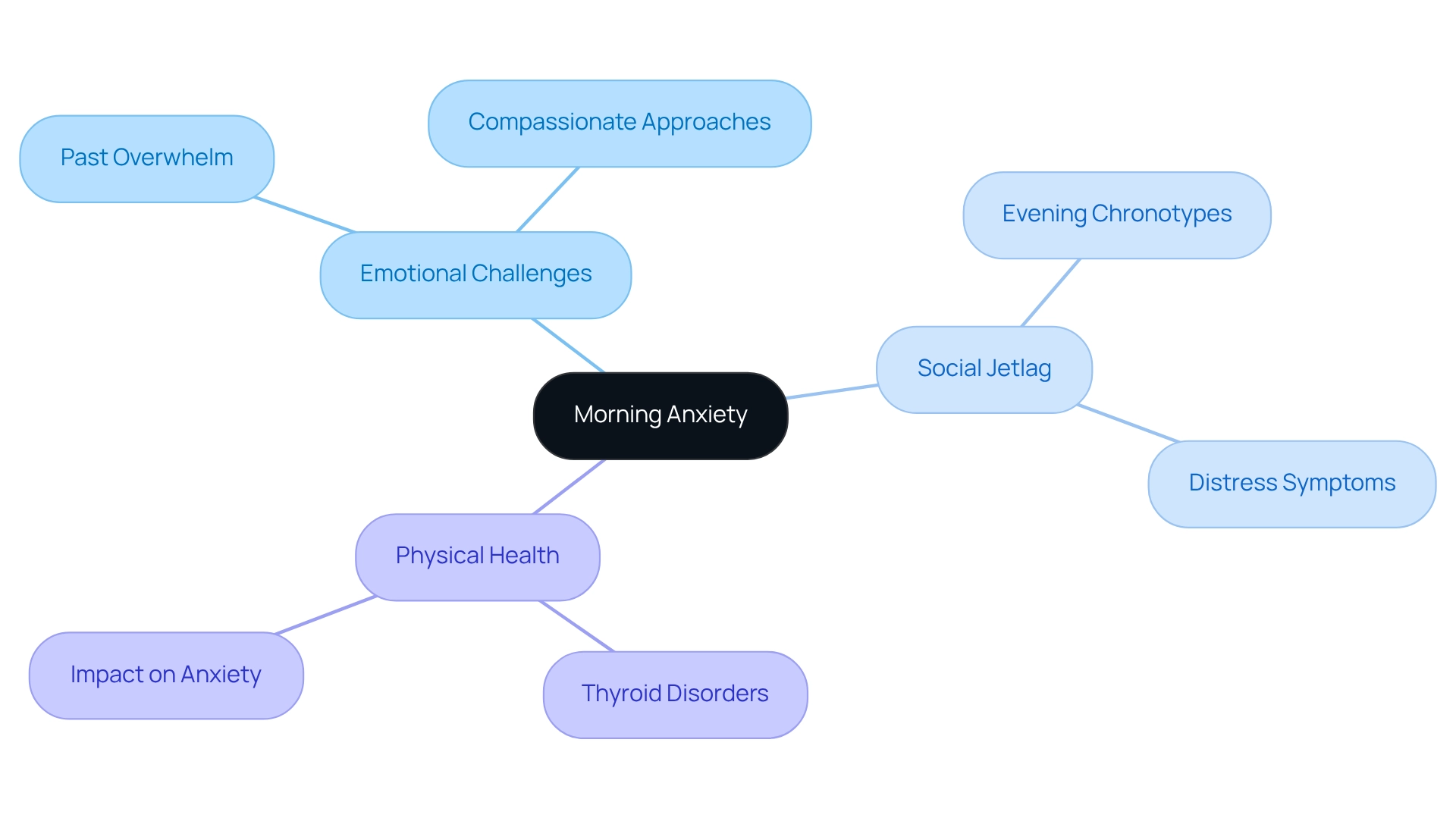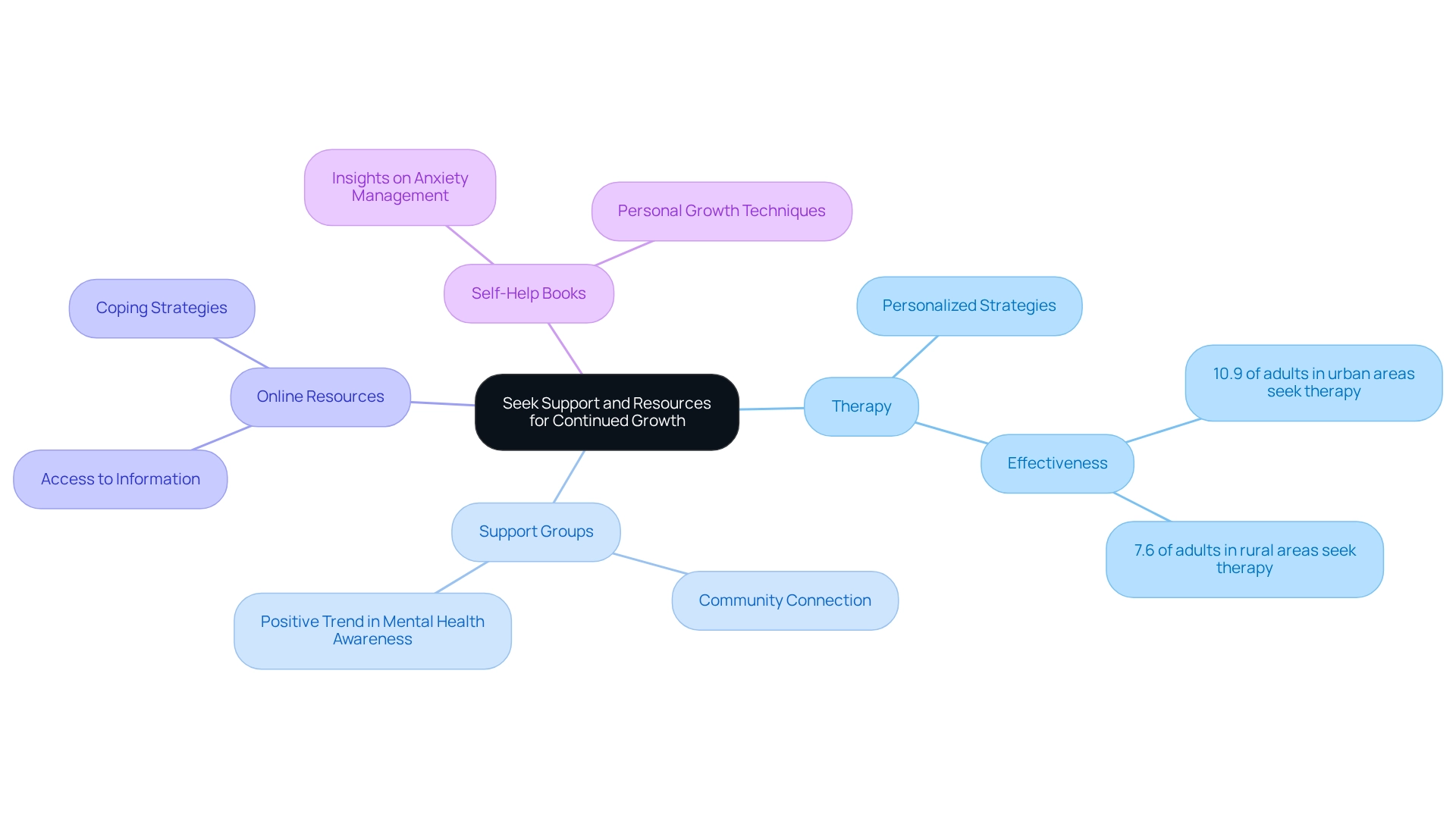Overview
This article gently outlines four essential steps to help break the cycle of morning anxiety. These steps include:
- Establishing a daily routine
- Practicing mindfulness
- Limiting stimulants
- Seeking support
Each strategy is backed by research and real-life examples, illustrating their effectiveness in alleviating symptoms of morning anxiety and fostering a more peaceful start to your day.
Have you ever felt overwhelmed by the anxiety that greets you each morning? By incorporating these nurturing strategies into your daily life, you can create a more calming and supportive environment for yourself. As we explore these steps further, remember that seeking help is a sign of strength, and you are not alone on this journey.
Embracing a daily routine can ground you, providing structure amidst the chaos. Mindfulness practices invite you to connect with your breath and thoughts, offering a moment of peace. Limiting stimulants can help reduce feelings of anxiety, allowing for a smoother transition into your day. And, reaching out for support can remind you that it’s okay to lean on others as you navigate your feelings.
By considering these steps, you can cultivate a more serene morning experience. Remember, healing is a journey, and taking these small steps can lead to significant changes in your emotional well-being.
Introduction
In the gentle moments of dawn, many individuals find themselves facing an unwelcome companion: morning anxiety. This common yet often misunderstood experience can show up as racing thoughts, physical symptoms, and a heavy sense of dread, transforming the start of the day into a daunting challenge.
Research indicates that a significant number of people are touched by these feelings, often rooted in deeper emotional issues or lifestyle factors like social jetlag. By recognizing and understanding morning anxiety, we can approach our experiences with empathy and curiosity, paving the way for effective management strategies.
As we explore this further, this article delves into the nature of morning anxiety, its symptoms, and practical approaches to help break the cycle, ultimately fostering a more peaceful and productive start to each day.
Understand Morning Anxiety
Morning apprehension often brings feelings of stress, worry, or dread that many of us experience upon waking. This is a common struggle; studies reveal that a significant number of individuals grapple with these emotions, frequently tied to unresolved stress from the previous day, hormonal changes, or sleep disturbances. Recognizing early-day unease as a shared concern can help normalize these feelings, reducing the stigma that often surrounds them.
Have you ever felt overwhelmed by your past? Understanding that this early-day unease often arises from deeper emotional challenges allows us to approach our feelings with compassion and curiosity rather than judgment. Recent studies highlight the role of social jetlag, particularly among evening chronotypes, in exacerbating distress symptoms. While social jetlag may not be the sole contributor to increased worry, it underscores the complex factors that influence our early-day feelings.
In addition to this, experts emphasize the importance of addressing , such as thyroid disorders, which can significantly affect our levels of distress. By acknowledging these connections, we can navigate our emotional landscape more effectively and seek the support we need. Real-life stories of individuals overcoming early-day stress illustrate that with the right techniques and understanding, it is indeed possible to learn how to break the cycle of morning anxiety and foster a more peaceful start to our days.

Identify Symptoms of Morning Anxiety
Recognizing signs of early-day stress is essential for understanding how to break the cycle of morning anxiety. Have you ever felt overwhelmed by your worries about how to break the cycle of morning anxiety related to the day ahead? Common indicators include:
- Racing thoughts, where individuals often experience an overwhelming flood of concerns that can lead to heightened unease.
- Physical symptoms may also arise, with many reporting rapid heartbeat, sweating, or tightness in the chest—physiological responses to distress.
- Emotional distress can dominate the morning, with feelings of dread or impending doom making it difficult to start the day positively, which is why understanding how to break the cycle of morning anxiety is essential.
- Distress can impair concentration, leading to challenges in completing tasks or making decisions.
- A pervasive sense of unease may manifest as restlessness, preventing relaxation.
Recognizing these symptoms is the first step toward understanding and managing distress effectively. Research indicates that a significant portion of the population experiences , with 6.1% of adults scoring 10 or higher on , highlighting the prevalence of these symptoms. By acknowledging these signs, individuals can take proactive steps on how to break the cycle of morning anxiety and seek appropriate support.
At The Emerald Couch, we offer personalized treatment plans that begin with an intake session, where we collaboratively develop goals and evaluate progress. In this session, we will explore particular strategies customized to your needs, assisting you in managing early-day stress efficiently. Remember, you are not alone in this journey, and support is available to help you find peace and clarity.
Implement Strategies to Break the Cycle
To learn how to break the cycle of morning anxiety, consider implementing the following strategies:
- Establish : Begin your day with a soothing ritual that may include activities like meditation, light stretching, or journaling. These practices can help set a positive tone for the day ahead. Remember, establishing a daily routine is a journey, and every positive step forward counts.
- Practice Mindfulness: Have you ever felt overwhelmed by your thoughts? Engaging in mindfulness exercises such as deep breathing or guided meditation can ground you in the present moment. These practices can significantly lower stress levels and enhance mental clarity.
- Limit Stimulants: It’s wise to decrease caffeine and sugar consumption, especially in the early hours, as these can worsen stress symptoms. Studies indicate that these substances can lead to increased anxiety, making it crucial to opt for healthier alternatives.
- Physical Activity: Incorporate light exercise, such as a walk or yoga session, to release endorphins and enhance your mood. Individuals who can adjust their routines to include flexibility often encounter less stress and improved mental resilience.
- Positive Affirmations: Start your day with positive affirmations to counter negative thoughts and build self-confidence. This practice can transform your mindset and nurture resilience against stress by teaching you how to break the cycle of morning anxiety, which will help diminish daily apprehension and promote a more tranquil beginning to your day. Real-life instances demonstrate that individuals who modify their daily routines to incorporate flexibility frequently encounter reduced stress and enhanced mental resilience. This highlights the significance of a tailored approach to managing worry. As we explore this further, remember that seeking support is a vital step towards healing.
Seek Support and Resources for Continued Growth
Seeking support is a vital step in effectively managing morning stress and understanding how to break the cycle of morning anxiety, especially for overachievers who often struggle with prioritizing their needs. Have you ever felt overwhelmed by your past? Consider the following resources:
- Therapy: Engaging with a mental health professional offers personalized strategies and tailored support to address your unique needs. Therapy has shown to be effective for stress-related disorders, with studies indicating significant improvements in symptoms for those who participate. For overachievers feeling overwhelmed, anxious, or burnt out, therapy can help you discover how to break the cycle of morning anxiety, slow down, become more present, and find solutions to avoid burning the candle at both ends. Data indicate that 10.9% of adults in major urban regions and 7.6% in rural areas seek counseling or therapy, emphasizing its availability and efficacy.
- Support Groups: Joining a support group enables you to connect with others who have similar situations, promoting a sense of community and comprehension. Recent surveys show that young adults increasingly recognize the importance of , reflecting a positive trend towards seeking help and reducing stigma. This shift is crucial, as 4.6% of females and 2.6% of males globally are impacted by stress, underscoring the need for supportive environments.
- Online Resources: Utilize online platforms that provide , articles, and forums for sharing experiences and coping strategies. These resources can be invaluable for those dealing with stress, offering insights and support at your fingertips. They can also help you find safety in your body and life again, giving your trauma its rightful place in your past.
- Self-Help Books: Explore literature focused on anxiety management and personal growth. These books can provide further insights and techniques to empower your journey toward healing.
Remember, reaching out for help is a sign of strength. Engaging with these resources can significantly enhance your journey toward resilience and well-being.

Conclusion
Morning anxiety is a common yet often overlooked challenge that many individuals face as they begin their day. Have you ever felt overwhelmed by your thoughts before even getting out of bed? By understanding its roots—ranging from unresolved stress and hormonal changes to social jetlag—recognizing the symptoms becomes the first step in managing this experience. Symptoms such as racing thoughts, physical distress, and emotional turmoil can greatly impact one’s ability to start the day on a positive note.
Implementing effective strategies is essential for breaking the cycle of morning anxiety. Establishing a calming morning routine, practicing mindfulness, limiting stimulants, engaging in physical activity, and using positive affirmations can significantly alleviate anxiety levels. These approaches not only foster a sense of peace but also empower individuals to take control of their mornings, leading to more productive and fulfilling days.
Seeking support through therapy, support groups, and online resources is equally important in navigating morning anxiety. By connecting with professionals and communities that understand these struggles, individuals can find tailored strategies and a sense of belonging. Ultimately, acknowledging morning anxiety as a shared experience opens the door to compassion, effective management techniques, and the possibility of a brighter start to each day. Through understanding and action, a peaceful morning is not just a dream but an achievable reality. Remember, you are not alone in this journey, and taking that first step toward healing can lead to transformative change.
Frequently Asked Questions
What is morning apprehension?
Morning apprehension refers to feelings of stress, worry, or dread that many individuals experience upon waking.
What causes morning apprehension?
Morning apprehension is often tied to unresolved stress from the previous day, hormonal changes, sleep disturbances, and deeper emotional challenges.
Is morning apprehension a common issue?
Yes, studies indicate that a significant number of individuals struggle with morning apprehension, making it a common concern.
How can recognizing morning apprehension help individuals?
Recognizing early-day unease as a shared concern can help normalize these feelings and reduce the stigma surrounding them.
What role does social jetlag play in morning anxiety?
Social jetlag, particularly among evening chronotypes, can exacerbate distress symptoms, although it is not the sole contributor to increased worry.
Are there physical health issues that can influence morning anxiety?
Yes, physical health issues, such as thyroid disorders, can significantly affect levels of distress and should be addressed to help mitigate morning anxiety.
Can individuals overcome morning anxiety?
Yes, real-life stories show that with the right techniques and understanding, it is possible to break the cycle of morning anxiety and foster a more peaceful start to the day.




